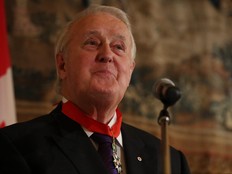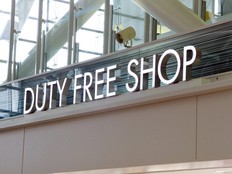Trump’s pick for commerce says president’s tariff threat could be just the beginning

Article content
WASHINGTON — The man U.S. President Donald Trump has chosen to oversee his tariff agenda says hitting Canada with 25 per cent across-the-board duties would be an emergency measure to achieve border security — and could be followed by more tariffs in the future.
During Wednesday’s Senate hearing on his nomination to lead the U.S. Department of Commerce, billionaire financier Howard Lutnick said the plan to impose duties on Canada and Mexico is distinct from Trump’s long-term tariff plans.
He said the threatened 25 per cent tariff is not a “tariff per se” but a type of domestic policy meant to force America’s neighbours to take action at the borders.
“You know that the labs in Canada are run by Mexican cartels. This tariff model is simply to shut their borders … Respect America,” Lutnick said Wednesday.“If we are your biggest trading partner, show us the respect. Shut your border and end fentanyl coming into this country.”
The number of people and drugs crossing illegally into the United States from Canada is minuscule compared to the volume crossing the United States’ southern border, a point Canadian Public Safety Minister David McGuinty made repeatedly in a news conference in Ottawa following Lutnick’s remarks.
Ottawa responded to Trump’s initial threat with a $1.3-billion border security plan and some provinces have separately boosted border enforcement. But the president has since expanded his complaints about Canada far beyond border security.
Lutnick said he believes Canada and Mexico are “acting swiftly” on border security “and if they execute it, there will be no tariff and if they don’t, then there will be.”
The White House press secretary said Tuesday that Trump was still considering implementing the tariffs on Saturday.
McGuinty said the federal government takes Lutnick’s comments seriously and it’s important to remind Trump’s team how far Canada has come on border security. He is travelling to Washington on Thursday to share that message directly with American officials.
“I’m quite convinced that the evidence that’s being presented to the administration will break through,” McGuinty said in Ottawa.
During Wednesday’s confirmation hearing, Lutnick was asked about the possible impacts of the tariffs on manufacturing and automotive industries. His answer suggested that even if Canada avoids the threatened border-related duties, it could still face tariffs in the near future following a multi-agency study of trade practices and deficits ordered by Trump.
Trump signed an executive action that, among other things, directs the secretary of commerce and the secretary of homeland security to assess migration and fentanyl flows from Canada, Mexico and China, and to recommend “appropriate trade and national security measures to resolve that emergency.”
It also instructs the U.S. trade representative to start consultations on the Canada-U.S.-Mexico Agreement.
Trump’s executive action says the report on trade with Canada is not due until April 1.
Lutnick said he prefers tariffs on entire countries, rather than on specific products. He said across-the-board tariffs “create reciprocity, fairness and respect.”
“My way of thinking, and I’ve discussed this with the president, is country by country, macro. Let America make it more fair,” Lutnick said. “We are treated horribly by the global trading environment. They all have higher tariffs, non-tariff trade barriers and subsidies. They treat us poorly.”
Canadian officials say they remain focused on thwarting the immediate tariff threat. Foreign Affairs Minister Melanie Joly was back in Washington, D.C., Wednesday and met with U.S. Secretary of State Marco Rubio and North Dakota Sen. Kevin Cramer, who is co-chair of the American-Canadian Economy and Security Caucus.
It’s Joly’s fifth visit to the U.S. since last November’s presidential election — part of her efforts to convince American lawmakers that imposing tariffs on Canada would run counter to both countries’ interests.
Canada’s case still needs to be made to other key Republicans, Joly said, but the Canadian message is resonating.
While Joly said her goal remains preventing tariffs, Ottawa is preparing for the president to make good on his threat.
Prime Minister Justin Trudeau held a virtual meeting with premiers Wednesday. New Brunswick Premier Susan Holt said they discussed the impact of tariffs, supports for provinces and ways to diversify exports to reduce Canada’s dependency on the United States.
Ottawa has prepared multiple options for retaliatory tariffs, depending on what Trump ultimately does. Trudeau has said repeatedly every option is on the table.
Premiers have largely claimed a united front but continue to share differing opinions on just how exactly Canada should respond.
Alberta Premier Danielle Smith called for the federal government to appoint a “border czar.” Quebec Premier Francois Legault said it’s important to secure the border followed by a quick move to negotiations with Americans to appease Trump’s other economic concerns.
Saskatchewan Premier Scott Moe cautioned against including oil and potash in any retaliatory measures, while Manitoba Premier Wab Kinew said if duties are applied, Canada’s response has to be noticed.
“We can’t be a punching bag,” Kinew said.
In his first official campaign event since dissolving the provincial legislature the day before, Ontario Progressive Conservative Leader Doug Ford said Trump’s duties are “a game to the president.”
“He seeks to divide and conquer, whether he imposes tariffs next week, next month or waits another year or more,” he said. “Trump’s threats are not going away.”
— With files from Allison Jones in Toronto, Hina Alam in Fredericton, Jack Farrell in Edmonton, Steve Lambert in Winnipeg, Morgan Lowrie in Montreal and Lauren Krugel in Calgary













Postmedia is committed to maintaining a lively but civil forum for discussion. Please keep comments relevant and respectful. Comments may take up to an hour to appear on the site. You will receive an email if there is a reply to your comment, an update to a thread you follow or if a user you follow comments. Visit our Community Guidelines for more information.